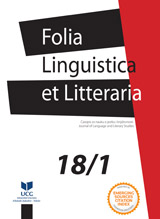MODALITÄTEN DER MACHT IM DEUTSCHEN GEGENWARTSDRAMA AM BEISPIEL VON ROLF HOCHHUTHS HEIL HITLER!
MODALITY OF POWER IN GERMAN MODERN DRAMA ON THE EXAMPLE OF ROLF HOCHHUTHS HEIL HITLER!
Author(s): Sonja NovakSubject(s): Theatre, Dance, Performing Arts, Cultural history, Political history, Sociology of Politics
Published by: Filološki fakultet, Nikšić
Keywords: power; tragedy; political theatre; Rolf Hochhuth;
Summary/Abstract: Political theatre is difficult to define and has always been tightly and directly connected to critical representations of (political) power: from the ancient Greek polis through the absolutistic state to the modern citizens‘ republic. The presence of such tendencies is visible in German theatre classics as well, e.g. Gotthold Ephraim Lessing‘s Emilia Gallotti, Friedrich Schiller‘s Kabale und Liebe, Johann Wolfgang von Goethe’s Götz von Berlichingen etc. These representations of power appeared almost exclusively in form of tragedies and depicted power personified in one character. As early as the mid-20th century, Friedrich Dürrenmatt observed in his essay Theaterprobleme (1954) that new forms of theatre art and dramatic genre are necessary to represent power, especially due to extensive socio-political and cultural changes our society has gone through. One of the major changes according to Dürrenmat is that contemporary (political) power is not as visible any more as it once was: it has become mechanized, abstract and faceless, similarly to the contemporary state represented by the government and its vast and enormous administration.
Journal: Folia Linguistica et Litteraria
- Issue Year: 2017
- Issue No: 18/1
- Page Range: 159-173
- Page Count: 15
- Language: German

